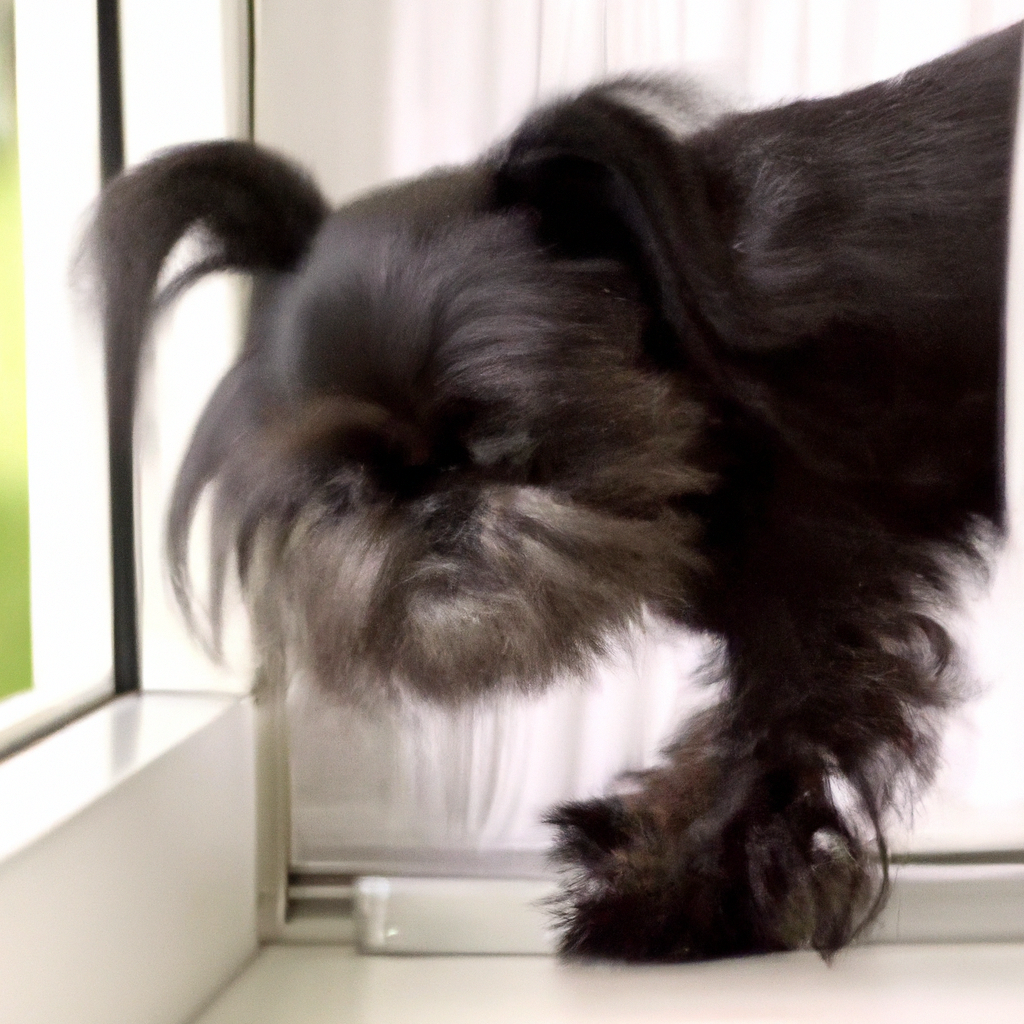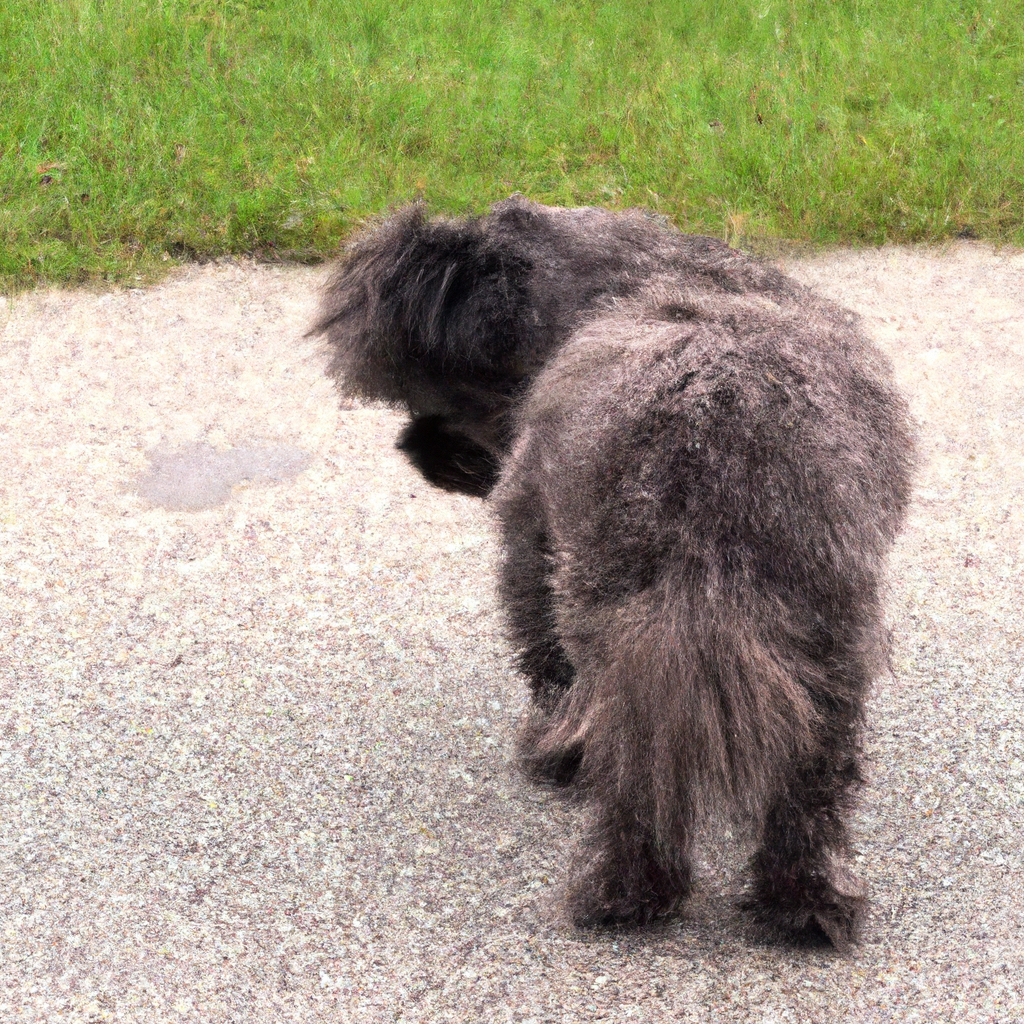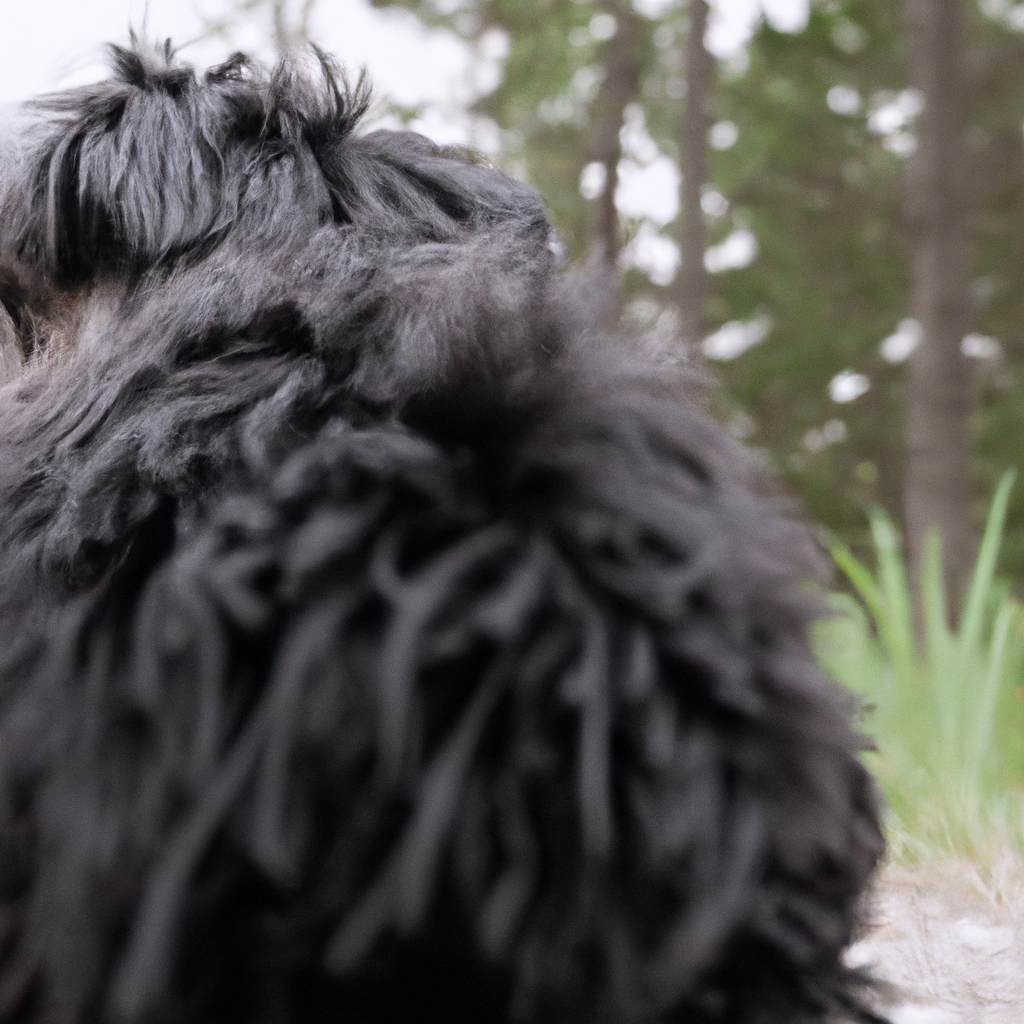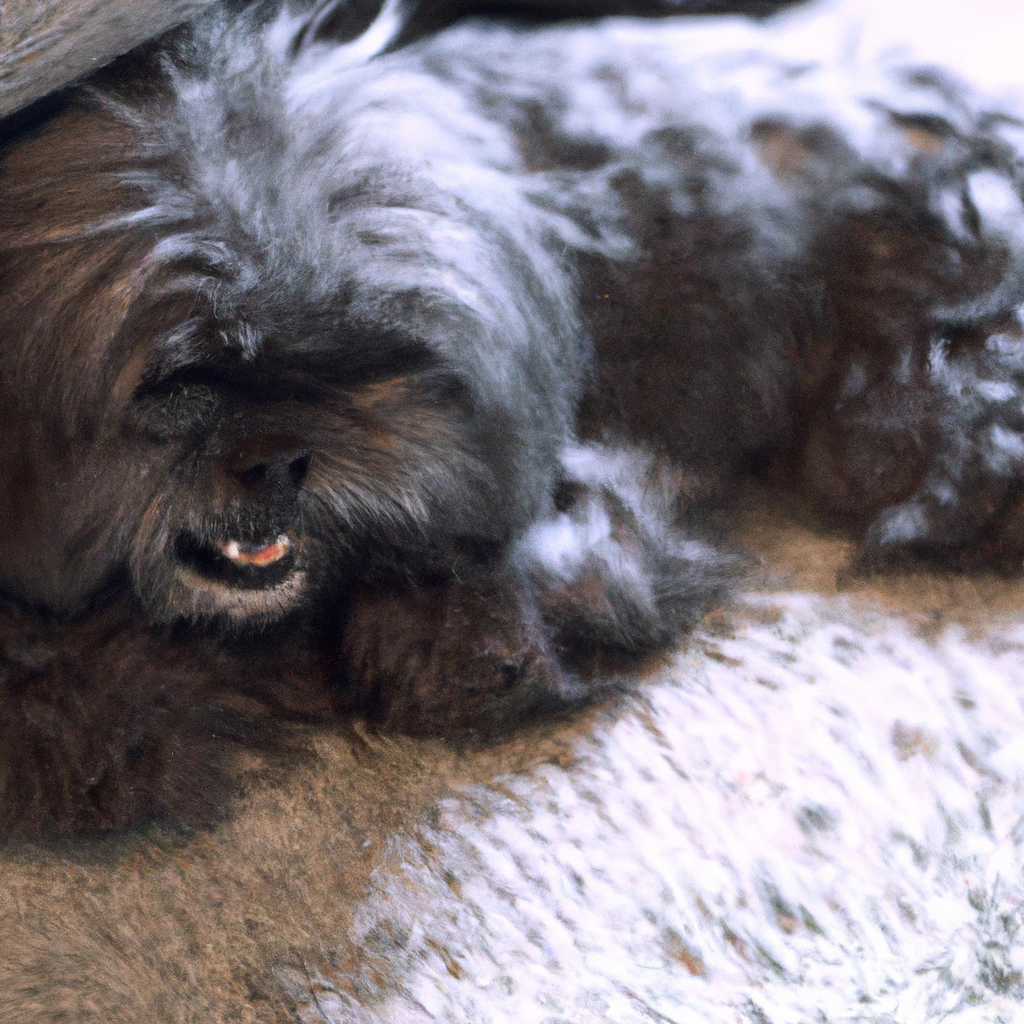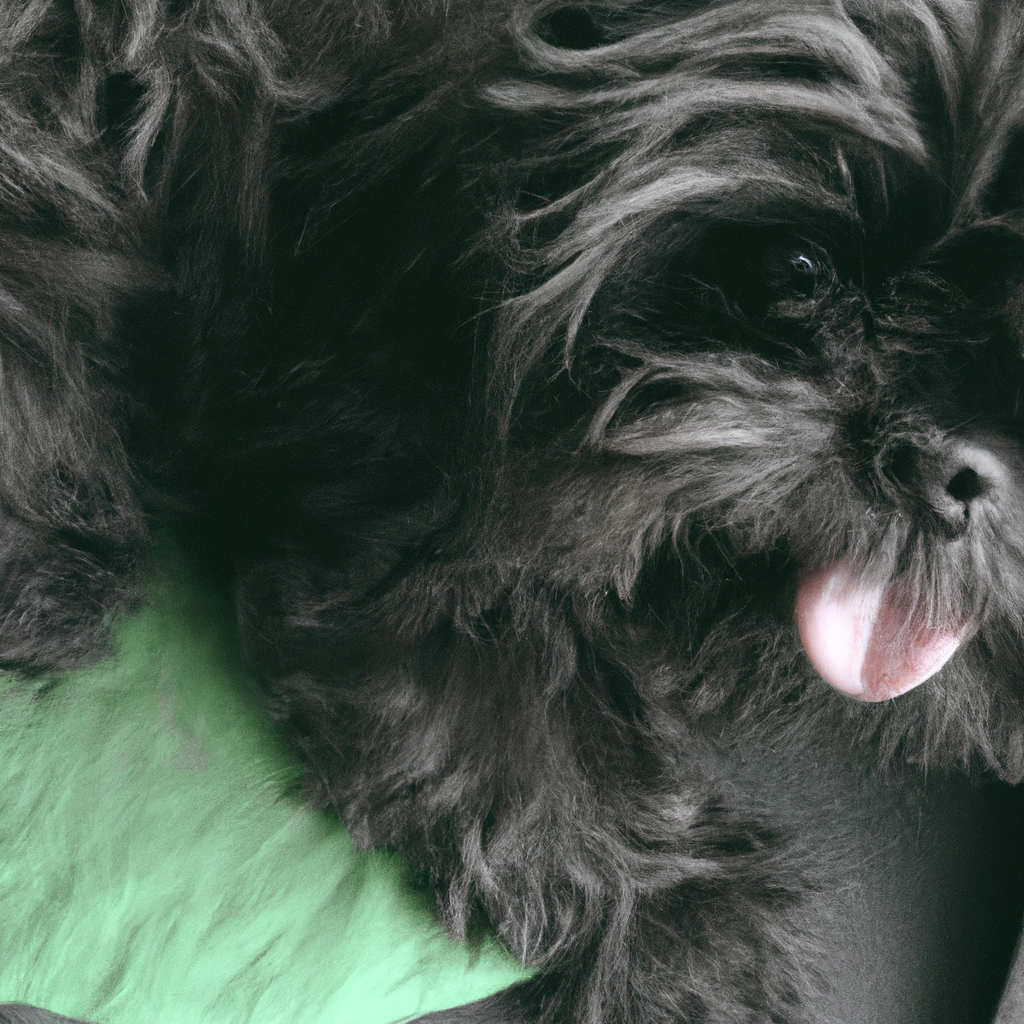Therapeutic approaches for Affenpinschers behavioral problems encompass a range of strategies designed to address and correct issues such as aggression, separation anxiety, excessive barking, and stubbornness. These approaches may include behavioral modification techniques, positive reinforcement training, socialization exercises, and in some cases, medication. The goal is to provide a structured environment where the Affenpinscher can learn appropriate behaviors, while also reducing stress and anxiety that may contribute to problematic behaviors. It’s important to note that each Affenpinscher may respond differently to various therapeutic approaches, thus individualized treatment plans are often necessary.
Understanding Affenpinschers: Behavioral Problems and Therapeutic Solutions
Affenpinschers, often referred to as “Monkey Terriers” due to their distinct primate-like appearance, are small but mighty dogs known for their playful and adventurous spirit. However, like any breed, they can sometimes exhibit behavioral problems. Understanding these issues and knowing how to address them through therapeutic approaches can significantly enhance the bond between you and your Affenpinscher.
Affenpinschers are generally sociable and friendly, but they can also be stubborn and protective. This protective nature can sometimes manifest as aggression, particularly towards other dogs and strangers. They may also exhibit signs of separation anxiety, becoming distressed when left alone. Additionally, their high energy levels can lead to hyperactivity, which can be challenging to manage without the right approach.
One of the most effective therapeutic approaches for managing behavioral problems in Affenpinschers is positive reinforcement training. This method involves rewarding good behavior, which encourages the dog to repeat it. For instance, if your Affenpinscher shows aggression towards another dog, redirect its attention and reward it when it behaves calmly. This approach not only helps manage the immediate issue but also teaches your dog how to behave in similar situations in the future.
Another therapeutic approach is socialization training. This is particularly useful for Affenpinschers that show aggression towards strangers or other dogs. By gradually exposing your dog to different people and animals in a controlled environment, you can help it become more comfortable and less aggressive in these situations. Remember, patience is key in this process. It’s important to start slow and gradually increase the level of exposure to avoid overwhelming your dog.
For Affenpinschers struggling with separation anxiety, creating a safe and comfortable space can be a therapeutic solution. This could be a specific room or a crate where your dog can retreat when it feels anxious. Providing toys and treats in this space can also help distract your dog and reduce its anxiety. Additionally, gradually increasing the time you spend away from your dog can help it become more comfortable being alone.
When it comes to managing hyperactivity, regular exercise is a must. Affenpinschers are energetic dogs that require daily physical activity to burn off their excess energy. This could be a walk in the park, a game of fetch, or even agility training. Mental stimulation is equally important. Puzzle toys, obedience training, and interactive games can help keep your Affenpinscher’s mind engaged and reduce hyperactivity.
In some cases, professional help may be necessary to manage your Affenpinscher’s behavioral problems. Animal behaviorists and professional dog trainers have the knowledge and experience to provide tailored solutions for your dog’s specific needs. They can also provide guidance and support to help you implement these solutions effectively.
In conclusion, understanding your Affenpinscher’s behavioral problems is the first step towards finding a solution. Whether it’s aggression, separation anxiety, or hyperactivity, there are therapeutic approaches available to help manage these issues. Remember, patience and consistency are key in this process. With time and effort, you can help your Affenpinscher become a well-behaved and happy member of your family.
Effective Therapeutic Techniques for Affenpinschers’ Aggression
Affenpinschers, affectionately known as “Monkey Dogs,” are small but mighty creatures. They are known for their distinctive appearance and lively personality. However, like any breed, they can sometimes exhibit behavioral problems, particularly aggression. This can be a cause for concern for many pet owners, but rest assured, there are effective therapeutic techniques that can help manage and even eliminate these issues.
Firstly, it’s important to understand that aggression in Affenpinschers, like in any dog breed, is often a response to fear or anxiety. They may feel threatened or uncomfortable, and their aggression is a way of protecting themselves. Therefore, one of the most effective therapeutic approaches is to identify and address the root cause of the fear or anxiety. This could be anything from a new environment, unfamiliar people, or even a specific object or situation. Once the source of anxiety is identified, it can be gradually introduced to the dog in a controlled and positive manner, helping them to become more comfortable and less reactive over time.
Another effective technique is positive reinforcement training. This involves rewarding the dog for good behavior, such as remaining calm in a situation where they would typically show aggression. The reward could be a treat, a favorite toy, or simply praise and affection. Over time, the dog will associate the positive behavior with the reward, encouraging them to repeat it. It’s important to remember that patience is key with this method, as it can take time for the dog to learn and adapt to new behaviors.
Socialization is also a crucial part of managing aggression in Affenpinschers. This breed is known for being somewhat territorial, so introducing them to a variety of people, animals, and environments from a young age can help them become more comfortable in different situations. Regular walks, trips to the dog park, or even play dates with other dogs can be beneficial. However, it’s important to ensure these experiences are positive and not overwhelming for the dog.
In some cases, professional help may be needed. Dog behaviorists or trainers can provide valuable insight and guidance, using their expertise to develop a tailored approach to managing your Affenpinscher’s aggression. They can also provide ongoing support and advice, helping you to navigate any challenges that may arise along the way.
Lastly, it’s worth noting that while these therapeutic techniques can be highly effective, they are not a quick fix. Managing aggression in Affenpinschers requires time, patience, and consistency. It’s also important to remember that every dog is unique, and what works for one may not work for another. Therefore, it may take some trial and error to find the approach that works best for your Affenpinscher.
In conclusion, while Affenpinschers can sometimes exhibit behavioral problems such as aggression, there are a variety of therapeutic techniques that can help manage these issues. By understanding the root cause of the aggression, using positive reinforcement training, socializing the dog, and seeking professional help if needed, you can help your Affenpinscher become a happier, more well-behaved pet.
Addressing Affenpinschers’ Anxiety: Therapeutic Approaches
Affenpinschers, affectionately known as “Monkey Dogs,” are small but mighty creatures known for their distinctive appearance and lively personality. However, like any other breed, they can sometimes exhibit behavioral problems, particularly anxiety. This can manifest in various ways, such as excessive barking, destructive behavior, or even aggression. Fortunately, there are several therapeutic approaches that can help manage and alleviate these issues.
Firstly, it’s important to understand that anxiety in Affenpinschers, like in humans, is often a response to stress. This could be due to a change in their environment, such as moving to a new home, or a traumatic event, like a visit to the vet. Therefore, one of the most effective ways to address anxiety in these dogs is by creating a stable, secure environment. This includes maintaining a consistent routine, providing plenty of physical and mental stimulation, and ensuring they feel safe and loved.
In addition to creating a stable environment, it’s also crucial to use positive reinforcement training methods. This involves rewarding good behavior with treats, praise, or playtime, rather than punishing bad behavior. This approach not only helps to build a strong bond between you and your Affenpinscher but also encourages them to repeat the desired behavior. It’s important to remember that patience is key here, as it can take time for your dog to learn and understand what is expected of them.
Another therapeutic approach to consider is desensitization and counter-conditioning. This involves gradually exposing your Affenpinscher to the source of their anxiety in a controlled way, while simultaneously associating it with positive experiences. For example, if your dog is anxious about car rides, you might start by simply sitting in the car with them and giving them treats or praise. Over time, you can gradually increase the duration and intensity of the exposure, until your dog no longer reacts anxiously.
In some cases, it may be beneficial to seek professional help. This could be a certified dog trainer or a veterinary behaviorist, who can provide personalized advice and guidance based on your Affenpinscher’s specific needs and circumstances. They can also help you identify any underlying medical issues that could be contributing to your dog’s anxiety, such as pain or illness.
Finally, it’s worth noting that there are also several natural remedies and supplements that can help to reduce anxiety in dogs. These include things like calming chews or sprays, which contain ingredients like chamomile and tryptophan that are known for their soothing properties. However, it’s always best to consult with your vet before introducing any new supplements into your dog’s diet.
In conclusion, while anxiety can be a challenging issue to deal with, there are many therapeutic approaches available that can help to manage and alleviate these problems in Affenpinschers. By understanding the root cause of the anxiety, providing a stable environment, using positive reinforcement training methods, and seeking professional help if needed, you can help your Affenpinscher lead a happier, healthier life.
Therapeutic Training Methods for Affenpinschers’ Destructive Behavior
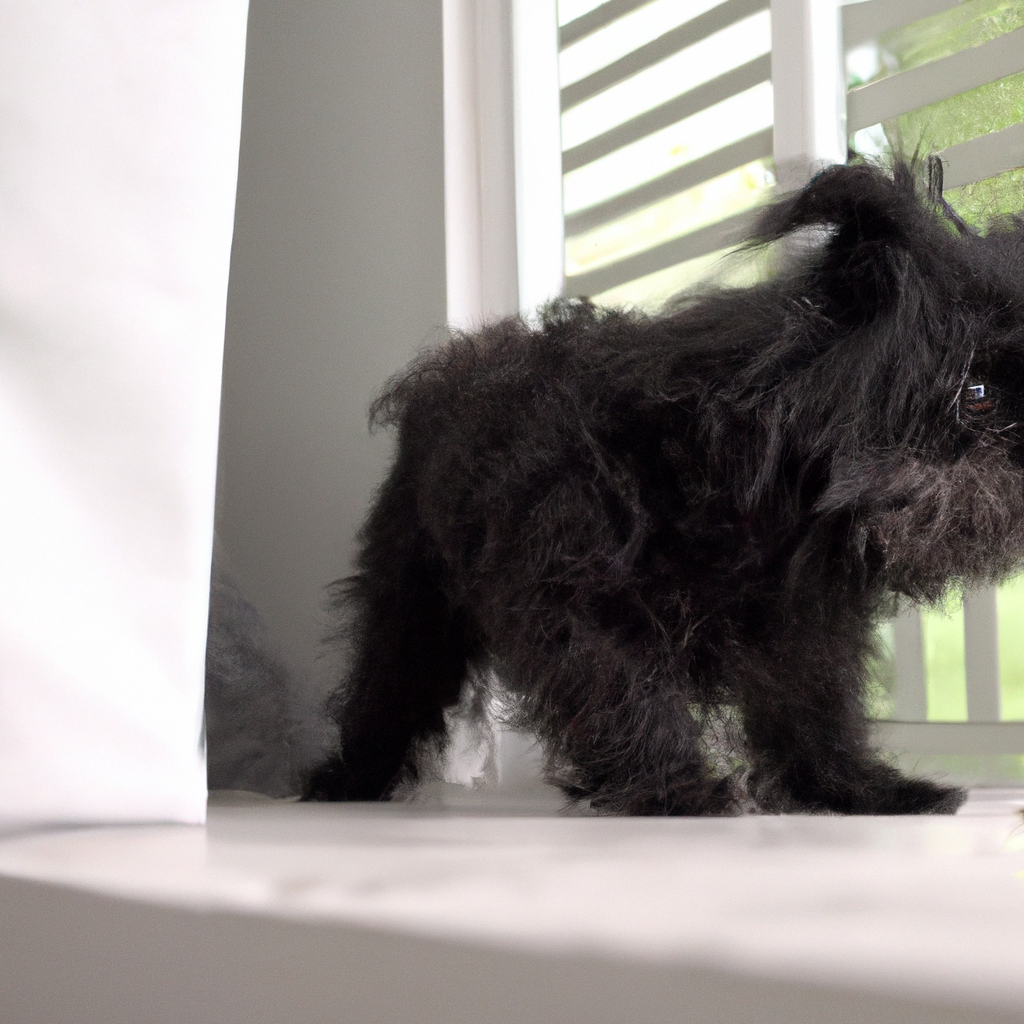
Affenpinschers, affectionately known as “Monkey Dogs,” are small but mighty creatures known for their distinctive appearance and lively personality. However, like any breed, they can sometimes exhibit behavioral problems, particularly destructive behavior. This can be a source of frustration for many pet owners, but it’s important to remember that these behaviors are often a sign of underlying issues that can be addressed through therapeutic training methods.
One of the most common reasons Affenpinschers engage in destructive behavior is due to anxiety or boredom. These dogs are highly intelligent and require mental stimulation to keep them happy and healthy. Without it, they may resort to destructive behaviors such as chewing on furniture or digging in the yard. To combat this, consider incorporating puzzle toys or interactive games into your Affenpinscher’s daily routine. These activities can provide the mental stimulation your dog needs and redirect their energy in a positive way.
Another therapeutic approach to addressing destructive behavior in Affenpinschers is through positive reinforcement training. This method involves rewarding your dog for good behavior, rather than punishing them for bad behavior. For example, if your Affenpinscher has a habit of chewing on shoes, you might redirect them to a chew toy and then reward them with a treat or praise when they use the toy instead. Over time, this can help your dog associate positive behaviors with rewards, making them more likely to repeat these behaviors in the future.
Socialization is also a crucial part of any Affenpinscher’s training. These dogs are known for their bold and protective nature, which can sometimes lead to aggressive behavior if not properly managed. Regular socialization with other dogs and people can help your Affenpinscher learn to behave appropriately in various situations. This can be achieved through regular walks, trips to the dog park, or even doggy daycare.
In some cases, destructive behavior in Affenpinschers may be a sign of a more serious issue, such as separation anxiety. If your dog becomes extremely anxious when you leave or destroys items in your absence, it may be worth consulting with a professional dog trainer or behaviorist. They can provide you with a tailored training plan and offer additional support to help manage your dog’s anxiety.
Lastly, it’s important to remember that patience is key when it comes to addressing behavioral problems in Affenpinschers. These dogs are known for their stubborn nature, so it may take time for them to learn new behaviors. However, with consistent training and plenty of love and understanding, you can help your Affenpinscher overcome their destructive habits and become a well-behaved member of your family.
In conclusion, while Affenpinschers can sometimes exhibit destructive behavior, there are several therapeutic training methods that can help address these issues. By providing mental stimulation, using positive reinforcement training, ensuring regular socialization, and seeking professional help if needed, you can help your Affenpinscher lead a happy, healthy, and well-behaved life. Remember, patience and consistency are key in this process, but the rewards of a well-behaved Affenpinscher are well worth the effort.
Overcoming Affenpinschers’ Separation Anxiety: Therapeutic Interventions
Affenpinschers, affectionately known as “Monkey Dogs,” are small but mighty creatures known for their distinctive appearance and lively personality. However, like many other breeds, they can sometimes exhibit behavioral problems, particularly separation anxiety. This is a condition where a dog becomes extremely anxious and distressed when left alone. It can manifest in various ways, such as excessive barking, destructive behavior, and even self-harm. Fortunately, there are several therapeutic interventions that can help Affenpinschers overcome this issue.
Firstly, it’s important to understand that separation anxiety is often rooted in a dog’s fear of being alone. Therefore, one of the most effective therapeutic approaches is gradual desensitization. This involves slowly acclimating your Affenpinscher to being alone for increasing periods of time. Start with just a few minutes and gradually extend this until your dog can comfortably be alone for several hours. Remember, patience is key here. Rushing the process can potentially exacerbate the anxiety.
Another therapeutic intervention is counter-conditioning. This technique aims to change your dog’s emotional response to being left alone. Instead of associating your departure with fear and anxiety, the goal is to create positive associations. This can be achieved by providing your Affenpinscher with a special treat or toy that they only get when you’re away. Over time, your dog will start to associate your absence with something positive, reducing their anxiety.
In addition to these behavioral techniques, there are also several natural remedies that can help alleviate separation anxiety in Affenpinschers. For instance, pheromone diffusers can create a calming environment for your dog. These devices release a synthetic version of the pheromones produced by mother dogs to comfort their puppies. Similarly, certain dietary supplements, such as those containing L-theanine or chamomile, can have a calming effect on dogs.
While these therapeutic interventions can be highly effective, it’s important to remember that every Affenpinscher is unique. What works for one dog may not work for another. Therefore, it’s crucial to monitor your dog’s behavior closely and adjust your approach as needed. If your Affenpinscher’s separation anxiety persists despite your best efforts, it may be time to consult with a professional. A certified animal behaviorist or a veterinarian can provide further guidance and potentially recommend additional treatments, such as medication.
In conclusion, while separation anxiety can be a challenging issue for Affenpinschers and their owners, it’s certainly not insurmountable. With patience, consistency, and the right therapeutic interventions, you can help your Affenpinscher feel more secure when left alone. Remember, the goal is not to eliminate your dog’s natural instinct to be with you, but rather to help them feel safe and comfortable even when you’re not around. After all, a happy, well-adjusted Affenpinscher is not only a joy to be around but also a testament to the power of understanding and compassionate dog ownership.
Therapeutic Strategies for Managing Affenpinschers’ Excessive Barking
Affenpinschers, affectionately known as “Monkey Dogs,” are small but mighty creatures known for their distinctive appearance and lively personality. However, like any breed, they can sometimes exhibit behavioral problems. One of the most common issues with Affenpinschers is excessive barking. This can be a nuisance, but it’s important to remember that barking is a natural behavior for dogs. It’s their way of communicating, and it’s our job as pet owners to understand and manage this behavior effectively.
Excessive barking in Affenpinschers can be triggered by a variety of factors. It could be a response to perceived threats, a call for attention, or even a sign of boredom. Understanding the root cause of the barking is the first step in addressing the issue. Once you’ve identified the trigger, you can then implement therapeutic strategies to manage the behavior.
One effective therapeutic approach is positive reinforcement. This involves rewarding your Affenpinscher for good behavior, such as being quiet when a visitor arrives. The reward could be a treat, a favorite toy, or simply some affectionate petting. Over time, your dog will associate being quiet with receiving a reward, which can help reduce excessive barking.
Another strategy is distraction. If your Affenpinscher starts barking excessively, try to divert its attention to something else. This could be a toy, a puzzle, or a command that your dog knows well. The idea is to break the cycle of barking by giving your dog something else to focus on.
Training is also a crucial part of managing excessive barking. Teaching your Affenpinscher commands such as “quiet” or “enough” can be very effective. However, it’s important to be patient and consistent with your training. Remember, it’s not about punishing your dog for barking, but rather teaching them when it’s appropriate to bark and when it’s not.
In some cases, excessive barking may be a sign of underlying anxiety or stress. If you suspect this might be the case, it’s worth consulting with a professional dog behaviorist or a vet. They can provide guidance on how to manage your dog’s anxiety and potentially recommend therapies such as pheromone diffusers or anxiety wraps.
Lastly, ensuring your Affenpinscher gets plenty of physical and mental stimulation can also help curb excessive barking. Regular walks, playtime, and mental challenges such as puzzle toys can help keep your dog entertained and less likely to bark out of boredom.
In conclusion, managing an Affenpinscher’s excessive barking requires understanding, patience, and consistency. It’s about teaching your dog when it’s appropriate to bark and providing them with the right outlets for their energy and communication needs. With the right therapeutic strategies, you can help your Affenpinscher become a quieter, happier member of your household. Remember, every dog is unique, so what works for one Affenpinscher might not work for another. It’s all about finding the right approach for your individual dog and situation.
Therapeutic Approaches to Improve Affenpinschers’ Socialization Skills
Affenpinschers, affectionately known as “Monkey Dogs,” are a small breed of dog known for their playful and adventurous nature. However, like any breed, they can sometimes exhibit behavioral problems, particularly in terms of socialization. Fortunately, there are several therapeutic approaches that can be used to improve an Affenpinscher’s socialization skills, helping them to become more comfortable and confident in a variety of situations.
One of the most effective therapeutic approaches for improving an Affenpinscher’s socialization skills is positive reinforcement training. This method involves rewarding the dog for displaying desirable behavior, such as calmly interacting with another dog or person. The reward can be anything the dog finds motivating, such as a tasty treat, a favorite toy, or praise and affection from their owner. Over time, the dog will begin to associate these positive experiences with social interactions, which can help to reduce anxiety and fear.
In addition to positive reinforcement training, desensitization and counter-conditioning can also be beneficial for Affenpinschers with socialization issues. Desensitization involves gradually exposing the dog to the thing or situation that causes them stress or fear, in a controlled and safe manner. For example, if an Affenpinscher is fearful of other dogs, they might start by observing other dogs from a distance, then gradually get closer over time as they become more comfortable.
Counter-conditioning, on the other hand, involves changing the dog’s emotional response to a particular stimulus. For instance, if an Affenpinscher reacts aggressively when they see another dog, the goal of counter-conditioning would be to change this reaction to a more positive one. This might involve giving the dog a treat or other reward whenever they see another dog, to help them associate the sight of other dogs with positive experiences.
Another therapeutic approach that can be helpful for Affenpinschers with socialization problems is socialization classes or playgroups. These provide a controlled environment where the dog can interact with other dogs and people under the supervision of a professional dog trainer. This can be a great way for Affenpinschers to practice their social skills and gain confidence in a safe and supportive setting.
Finally, it’s important to remember that patience and consistency are key when working on socialization issues with an Affenpinscher. Behavioral changes don’t happen overnight, and it’s crucial to keep up with the training and therapeutic approaches even when progress seems slow. It’s also important to always ensure that the dog feels safe and comfortable during the process, as pushing them too hard can potentially exacerbate their fears or anxieties.
In conclusion, while Affenpinschers can sometimes struggle with socialization, there are several therapeutic approaches that can help to improve their skills and confidence. Whether it’s through positive reinforcement training, desensitization and counter-conditioning, or socialization classes, these methods can all contribute to helping an Affenpinscher become more comfortable and confident in social situations. With patience, consistency, and a positive approach, Affenpinschers can overcome their socialization issues and become the playful, adventurous companions they’re known to be.
Using Therapeutic Techniques to Address Affenpinschers’ Fear and Phobias
Affenpinschers, affectionately known as “Monkey Dogs,” are small but mighty creatures known for their distinctive appearance and lively personality. However, like any other breed, they can sometimes exhibit behavioral problems, particularly fear and phobias. Fortunately, there are therapeutic techniques that can be used to address these issues, helping your Affenpinscher live a happier, healthier life.
Fear and phobias in Affenpinschers can manifest in various ways, such as excessive barking, hiding, or even aggression. These behaviors are often a response to specific triggers, which can range from loud noises and new environments to unfamiliar people or other animals. Understanding these triggers is the first step in addressing your Affenpinscher’s fear and phobias.
One of the most effective therapeutic techniques for managing fear and phobias in Affenpinschers is desensitization. This involves gradually exposing your dog to the thing they fear in a controlled, safe environment. For instance, if your Affenpinscher is afraid of loud noises, you might start by playing a recording of the noise at a very low volume, gradually increasing the volume over time. The goal is to help your dog become accustomed to the trigger, reducing their fear response.
Counter-conditioning is another useful technique. This involves changing your Affenpinscher’s emotional response to the fear trigger. For example, if your dog is afraid of strangers, you might have a friend they haven’t met before give them a treat. Over time, your dog will start to associate strangers with positive experiences, rather than fear.
It’s important to note that these techniques should be implemented slowly and patiently. Pushing your Affenpinscher too quickly can potentially make their fear or phobia worse. It’s also crucial to reward your dog for their bravery. Positive reinforcement, such as treats, praise, or playtime, can go a long way in helping your dog overcome their fears.
In some cases, you might find it helpful to seek the assistance of a professional dog trainer or behaviorist. These experts can provide personalized guidance based on your Affenpinscher’s specific fears and phobias. They can also help you understand the underlying causes of your dog’s behavior, which can be particularly useful if your dog’s fear or phobia seems to have come out of nowhere.
While therapeutic techniques can be highly effective in managing fear and phobias in Affenpinschers, it’s also important to consider your dog’s overall health and wellbeing. Regular exercise, a balanced diet, and plenty of socialization can all contribute to a more confident, less fearful dog. Additionally, regular check-ups with your vet can help ensure that there are no underlying health issues contributing to your dog’s behavior.
In conclusion, fear and phobias in Affenpinschers can be challenging to manage, but with patience, understanding, and the right therapeutic techniques, it’s entirely possible to help your dog overcome these issues. Remember, every dog is unique, and what works for one Affenpinscher might not work for another. The key is to stay patient, be consistent, and always approach your dog with love and understanding. With time and effort, you can help your Affenpinscher live a happier, more confident life.In conclusion, therapeutic approaches for Affenpinschers behavioral problems involve a combination of training, socialization, and positive reinforcement. These methods can help manage and mitigate issues such as aggression, separation anxiety, and stubbornness. In some cases, professional help from a dog behaviorist may be necessary. It’s also important to remember that each Affenpinscher is unique and what works for one may not work for another. Therefore, a tailored approach is often the most effective.
